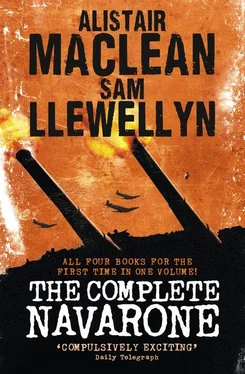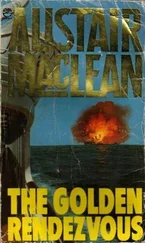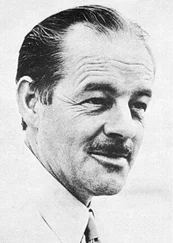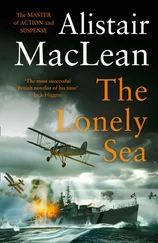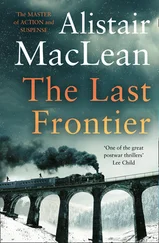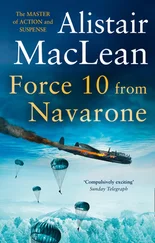‘With my life,’ said Clytemnestra.
Andrea watched the lorry turn in the road and rattle off the way it had come. He looked across at the Acropolis. There were lights; too many lights for his liking. Silent as the night itself, he padded along the road to the quarry gates.
He heard the sound of voices, saw the glow of a cigarette where a couple of sentries were finding courage in conversation. Down the chainlink fence a little, he found a place where the base of the wire was loose. He wormed his way under. The root of the causeway lay just ahead and to the left. Andrea clapped a German steel helmet on his head, straightened up, and began to march steadily along the sleepers towards the Acropolis.
Mallory hung three hundred feet above the village, and wished he could smoke. He had almost forgotten what it was to walk upright on level ground. His bones felt the pull of gravity, and groaned.
As he stood wedged into a crevice, he had the sense that things had gone badly wrong. Below, the village was heaving with German soldiery. Andrea was out there in the night, on an errand that had only the smallest chance of succeeding. Miller, Spiro and Carstairs were treed in the belfry. Benzedrine or not, he was too tired. He needed four hours’ sleep. But in four hours it would be getting light. The enemy were waiting for the light, so they could find the scattered elements of the Thunderbolt Force and pick them off one by one. Command and control were what was needed. Command and control. Big words. Words for men who were not so tired that they could hardly move.
Mallory looked down. The church was below him. He needed to regain the belfry: establish rotas, stand watches, organize a way out, make the second rendezvous at dawn. He needed a way down to the church.
There was no way down that did not go straight through five hundred Germans.
In the square below, sentries had been posted. The world had settled. Hot pursuit had cooled. All the Germans had to do was wait. There had been too many operations, too much action, too little sleep. The Thunderbolt Force was fragmented like quicksilver. This looked very like The End –
Above Mallory’s head, something made a small noise. To his right, a pale streak had come into being on the dark rock. To his left, another. Ropes.
There was a new noise: a clinking and grinding. Boots.
Mallory knew then that he had been wrong about the waiting. The Germans were on the front foot; someone somewhere had argued his case, and argued it well. They were searching the Acropolis, pebble by pebble. The Wehrmacht garrison would not be combing cliff faces with ropes. This was Sonderkommando work. The work of Dieter Wolf, highly professional, utterly deadly.
Mallory unslung his own rope and looked down into the square. There were half-a-dozen men there, no more. The architectural and human debris of Miller’s grenades had been cleared away. There were the men descending from above, and the men waiting below. And Mallory in the middle.
From the movements of the ropes on either side, the men were quartering the cliff, poking their noses into every little nook and cranny, methodical at last. It was the least you expected of an élite German unit.
The men down below, possibly over confident, were not in cover.
Mallory made his plan.
Reaching out, he grabbed the nearest rope and sawed it off short with a razor blade from his shaving kit. Then he hauled in the other rope. In its middle he tied a marlinespike hitch and placed the knot around a hand grenade. Finally, he took the rope he had cut, coiled it, and belayed it to a little post of rock.
Mallory fitted the flash eliminator to the Mauser, and wished he had a silencer. But silencers cut the muzzle velocity, and their steel-wool baffles only worked for half a dozen shots. He filled the magazine and slotted it silently into the rifle. The scuffling noises from above were louder now. He ran the telescopic sight over the square. Two men in the open. Two behind the buttresses of the church. The gleam of a helmet in the alley.
Mallory made a list in his mind, measuring the necessary movements of the carbine. Then he took a deep breath, sighted on the gleam in the alley, and pulled the trigger.
The gun roared. He moved to the men by the church, one, two; one dead, one winged, but the heavy bullet would do him no good, and the men in the middle of the square were diving for cover as Mallory worked the bolt and pulled the trigger. One of them was down, not moving, the other one a pair of heels vanishing behind the buttress, damn, and the cat was properly among the pigeons now.
Mallory pulled the pin on the hand grenade he had looped into the searcher’s rope and let it swing away. He kicked the rope he had cut out into space, grabbed it, and went down as close to free fall as made no difference. There were shots from below, but the bullets went wide. Mallory’s boots hit the cliff, and he bounced out, a wide arc, descending. There was a scream from above. One of the searchers had discovered that his rope had shrunk. A body whistled past, bounced once, and crashed into the buildings at the cliff’s foot. Mallory was slowing now, crabbing sideways for the roof of a building. The bullets were getting closer. Then there was a heavy explosion overhead, and another body whizzed past, preceded this time by a length of rope. The grenade had done its stuff –
Mallory landed on a roof, let go of the rope and rolled, unhitching his Schmeisser. He was breathing hard, his heart hammering at his ribs. Above him in the lights he saw three men descending, foreshortened. He loosed off a burst at them, saw two of them let go, heard the crash of their bodies coming down. The third stopped in a crease of black shadow. Mallory saw the muzzle flash. Rounds whacked into the roof around him, and grit stung his face. He felt naked on this roasting-pan of a roof. There was no cover. He squeezed off another burst at the cliff face and scuttled to the edge of the roof. Bullets cracked past his head, whipping across the cobbles from the direction of the church. He could feel the breath rasping, the sweat running. Another burst of bullets from on high kicked chips out of the parapet by his head. He took another look at the square, squeezed off a burst, rolled over the parapet and dropped to the cobbles.
It was a long drop, longer than it had appeared. Mallory landed awkwardly, felt his ankle turn as far as his boot would let it, sharp prongs of pain jab up towards his knee. No more climbing, he thought, rolling and firing at the same time, heading for the patch of shadow, ankle hurting like hell and going to hurt worse later, if anything was going to be hurting at all –
He was across the alley and in the shadow. His helmet crashed into stone. A mounting block. He was invisible, in cover. Safe as houses.
For as long as it took someone to unhook a grenade. Say, twenty seconds. There was no way out. Mallory fought the Benzedrine, and the pain, and the weariness, scrabbling for an answer. Miller was up in the tower. Wills was off with Clytemnestra. Andrea was … well, God knew where Andrea was. The important thing was not to give Miller away. If they found Miller, they found Spiro, and if they found Spiro, Spiro could be expected to tell them everything he knew.
As far as Mallory was concerned, there were no answers.
A great hush fell over the square. Mallory lay, ears pricked, waiting for the fizz of the grenade fuse, the rattle of metal on stone that would signal the finish.
But instead, he heard a voice.
‘Herr Kapitän Mallory,’ it said. It was a military voice, with an odd, bubbling hiss in it. How the hell does he know my name? thought Mallory.
‘We have recognized you,’ said the voice, as if it had heard his thoughts, ‘by your skill, at first, it must be said. Kapitän Mallory, there are things I should like to know.’
Читать дальше
Конец ознакомительного отрывка
Купить книгу
